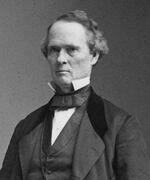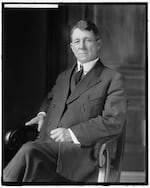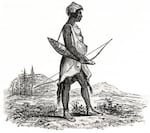Lane County, which encompasses Oregon’s third largest city and the University of Oregon, is named after Joseph Lane. And if you grew up in this state you probably have some basic knowledge on who he is: the first governor of the Oregon Territory.
But now there’s a renewed interest in changing the name of this county because of Lane’s ties to the Confederacy and his abuses against Native American tribes. It’s part of a nationwide effort to rename institutions with racist underpinnings like schools, military bases and sports teams, and it’s just another part of how the United States is confronting its racist foundations.

Joseph Lane was a controversial political figure in Oregon, even during his time, for his support of slavery and the Confederate South.
Public Domain
Joseph Lane was regarded as a war hero by the U.S. government after leading some key victories in the U.S.- Mexico war from 1846-1848. A reward, of sorts, was an appointment by President James K. Polk in 1848 to be the first governor of the Oregon Territory. That alone is enough to get something named after you in this state, said historian and University of Oregon doctoral candidate Marc Carpenter. Carpenter has written extensively on the Lane family and their history with Indigenous tribes of the Pacific Northwest.
Lane continued to gain prominence in Oregon after securing treaties with the Indigenous peoples of the area that heavily favored the territory and the U.S. His negotiating tactics included violent physical threats, and the treaties resulted in the loss of land to several Native American tribes of Western Oregon.

Harry Lane was known as a progressive Democrat at the end of the 19th century. He was a the mayor of Portland and later a U.S. senator for the state of Oregon.
Harris and Ewing / Library of Congress, Prints & Photographs Division
“He was very famous as a fighter against the people of Mexico and [Native Americans] in his time,” Carpenter said. “Those were incredibly popular positions to take.”
A few years later, in 1851, Lane became the Oregon Territory’s delegate to the United States Congress. That was also the year that the territory’s legislature named a stretch of land from the Pacific Ocean to the Cascades after Lane.
But Lane’s political career was not unmarred in Oregon. Lane climbed up the ranks in the years before the Civil War, and he was a Democrat with Confederate sympathies, especially when it came to slavery, Carpenter said. Although the majority of people living in the Oregon territory at the time were extremely racist, they were also strongly against slavery. So when Lane became the vice presidential candidate for the pro-slavery Democratic Party in 1860, it drove a wedge between him and his constituents.
And more recent research into Lane has revealed that he secretly held at least two Indigenous people as slaves in Oregon, even though slavery was outlawed in the state, according to Carpenter.
“Once he seemed anti-union, once he seemed like he might be a traitor, that was it on the statewide level for Joseph Lane,” Carpenter said.
Lane ultimately lost his vice presidential bid when Abraham Lincoln won election, with Hannibal Hamlin as Lincoln’s running mate.
After that, Lane unsuccessfully attempted to regain political power in Oregon by painting himself as a loyal and trustworthy negotiator to Indigenous people, even as he continued to defend Confederate ideals. And that forced him to end his political career early.
Ironically, the whitewashing done by Lane influenced his grandson, Harry Lane. Harry, who also became an Oregon politician, thought he was following in the footsteps of his grandfather when he fought for the rights of Native American people in the early 20th century.
A county to honor Kalapuya
“We are all members of the State of Oregon and to have a county with [Joseph Lane’s] name, when he was really kind of an exterminator for Native peoples, is wrong,” said David Lewis, an anthropology and ethnic studies professor at Oregon State University.
Lewis, who is Indigenous to Western Oregon, is one of thousands of petitioners who would like to see Lane County change its name. His suggestion: Kalapuya County.
The Kalapuyan tribes have called the Willamette Valley home for some 10,000 years, Lewis said. But violent clashes brought on by white leaders like Joseph Lane and disease introduced by white settlers decimated the once populous and vibrant Kalapuyan communities. In a letter addressed to the Lane County Commissioners, Lewis wrote that renaming the county after an Indigenous tribe is a necessary step in the decolonization of Oregon.
“[Indigenous people] were mostly removed from the valley and they lost everything, their homeland,” Lewis said. “It would, at least, be nice to honor them with a county.”
There is currently one county named after a Kalapuyan tribe in Oregon, Yamhill County, which is named after the Yamel Kalapuyans, according to Lewis.

Among the Indigenous people in Western Oregon were the Kalapuyans, a group of tribes that spoke the Kalapuyan language. Above, an 1841 woodcut of a Kalapuya man, by Alfred Agate.
Alfred Agate / Courtesy of David Lewis
Other petitioners have brought up the idea of simply rededicating Lane County to Joseph Lane’s grandson, Harry. Lewis is not on board with this proposal.
“[Harry’s] not an important figure in history, even for Native peoples,” Lewis said. “And people are just going to ignore that anyway. They’re just going to think of Joe Lane because he’s the most prominent figure in our [written] history.”
Lane County Commissioner Chair Heather Buch said this name change issue has been brought before the board before and the ongoing racial justice movement in the U.S. has bolstered it.
“The commissioners are seriously thinking about it and determining what we should do,” Buch said. “I can’t speak for the other commissioners, but I think it’s high time that we’ve talked about this.”
In June, the commissioners directed county staff to take a deeper look at the history of Joseph Lane and to identify next steps for the creation of a task force that would consider changing the name of the county.
The board heard some of the initial recommendations from staff, in a 20-page report, on Tuesday. The report highlighted that changing the name of the county would cost a lot more than rededicating it, although it could not give any hard figures. It also said renaming could have a ripple effect as other buildings, streets and private institutions in Oregon are also named after Joseph Lane or the county itself, like Lane Community College.
Commissioners made no immediate decisions on the Lane name. They instead directed staff to come back with a more thorough report that will include viewpoints from community organizations and more firm cost estimates.
A name change like this is not unheard of in Oregon. There have been about 20 proposals over the past year to change the names of geographic areas with racist monikers in the state, such as Dead Indian Memorial Road and Negro Ben Mountain. There is no modern precedent for changing the name of a county, though. If the Oregon law that establishes how to rename city streets sheds any light, the procedure to do this, at the very least, would involve several commission discussions and public hearings.
If a name change were to occur in Lane County in the future, it should be up to the people living in the county, Buch said.
“I feel strongly that if we do change the name, it should be a vote of the people,” Buch said. “I would think that the commissioners would put something on a ballot.”
No matter how it would happen, historian Carpenter said, the people of Oregon should be reconsidering how we’ve named areas after people just because they were the first white person to do something, rather than based on substantive accomplishments or moral achievements.
“I hope that we can start with Lane, but not end with Lane,” Carpenter said. “I hope we can look more broadly at the way that we’ve named the state after whiteness.”
Hear the entire conversation with Marc Carpenter in the media player above.



